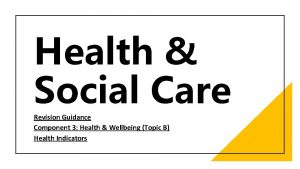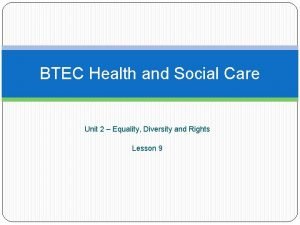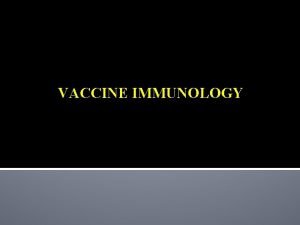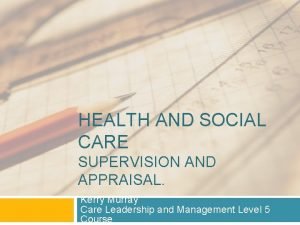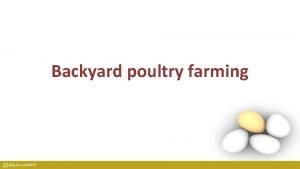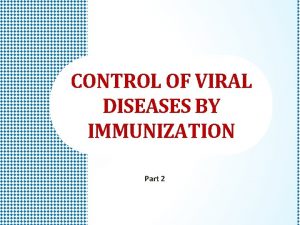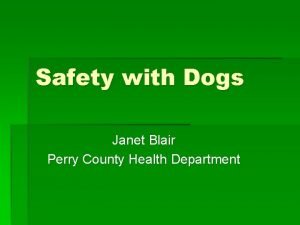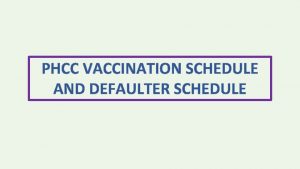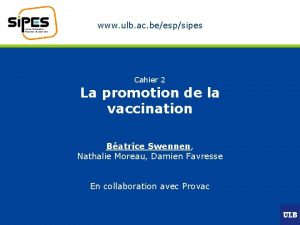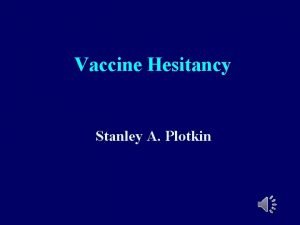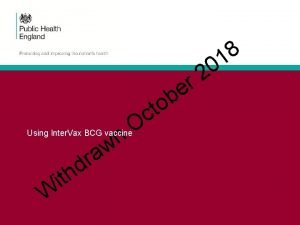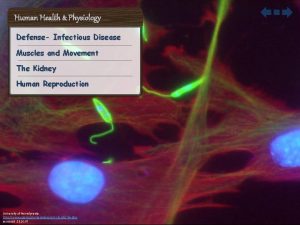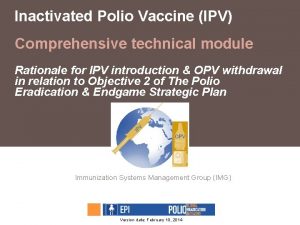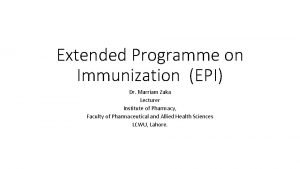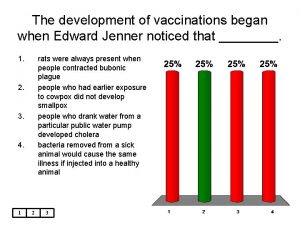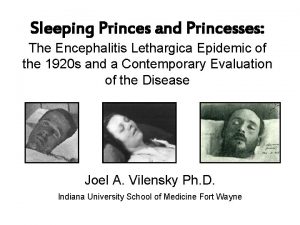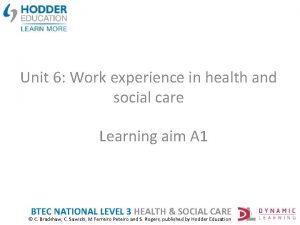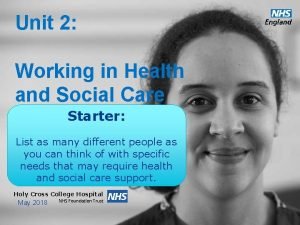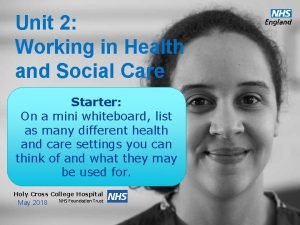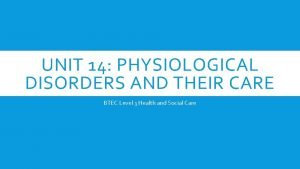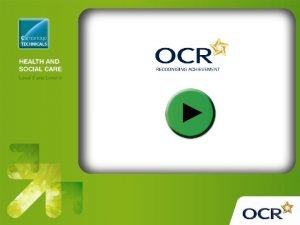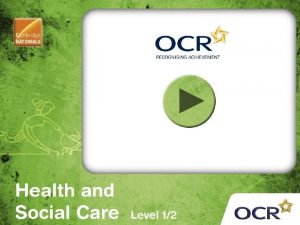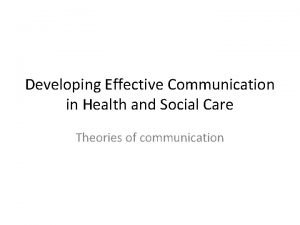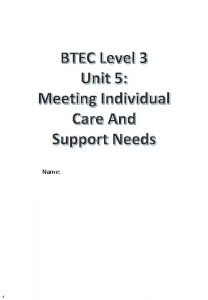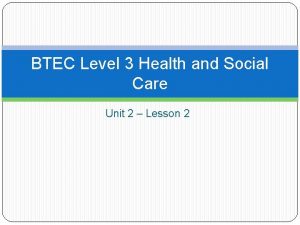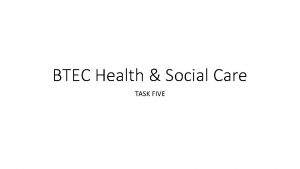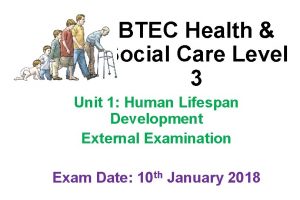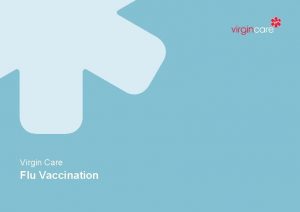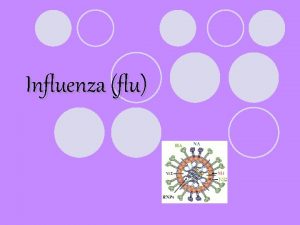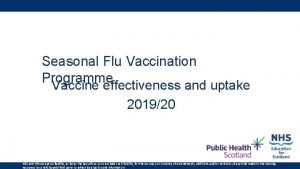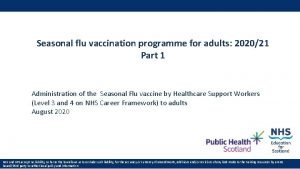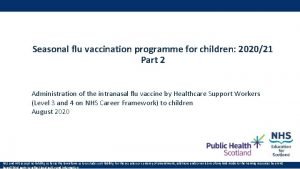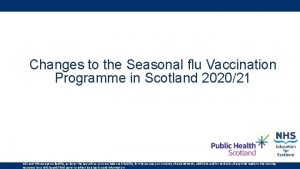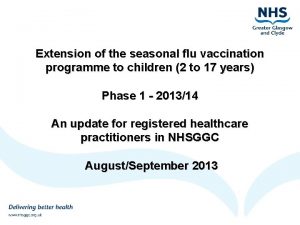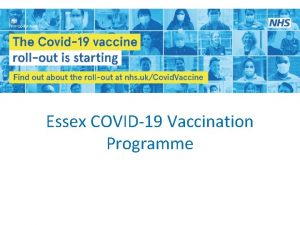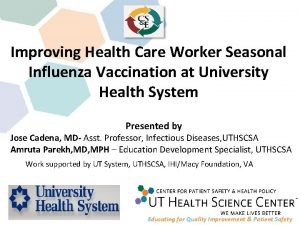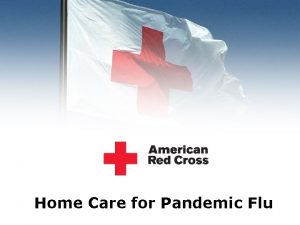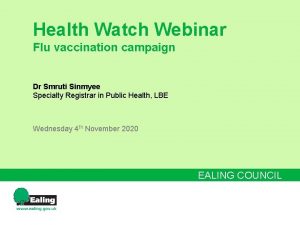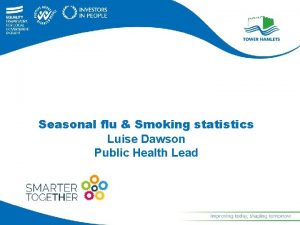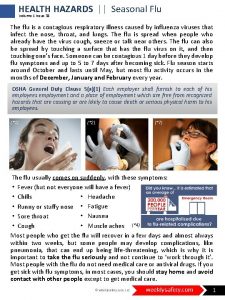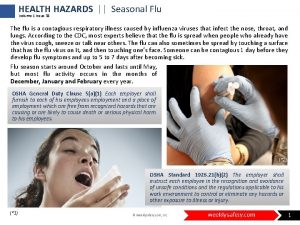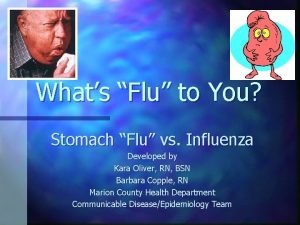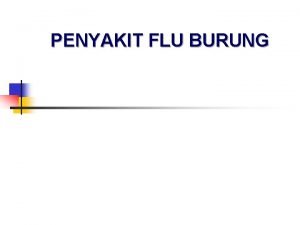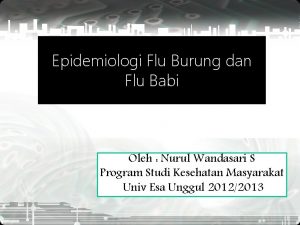Seasonal Flu Vaccination for Health and Social Care


































- Slides: 34

Seasonal Flu Vaccination for Health and Social Care Workers Reviewed July 2020 NES and HPS accept no liability, as far as the law allows us to exclude such liability, for the accuracy or currency of amendments, additions and/or revisions of any kind made to the training resources by a NHS board/third party to reflect local policy and information

Aim of this resource This resource aims to update knowledge amongst the Health and Social Care workforce of flu and the benefits of flu vaccination NES and HPS accept no liability, as far as the law allows us to exclude such liability, for the accuracy or currency of amendments, additions and/or revisions of any kind made to the training resources by a NHS board/third party to reflect local policy and information

Learning Outcomes On completion of this resource you will be able to: • Describe the nature of the influenza virus • Explain the risks of flu to health and social care workers and to those they care for NES and HPS accept no liability, as far as the law allows us to exclude such liability, for the accuracy or currency of amendments, additions and/or revisions of any kind made to the training resources by a NHS board/third party to reflect local policy and information

Learning Outcomes (cont’d) • Describe the impact of flu and the importance of receiving the seasonal flu vaccine • Discuss how the flu vaccine works • Dispel the common myths around flu and the flu vaccine NES and HPS accept no liability, as far as the law allows us to exclude such liability, for the accuracy or currency of amendments, additions and/or revisions of any kind made to the training resources by a NHS board/third party to reflect local policy and information

COVID-19 Pandemic Given the impact of the COVID-19 on the most vulnerable of society, it is imperative that we do all we can to reduce the impact of seasonal flu to those most at risk. NES and HPS accept no liability, as far as the law allows us to exclude such liability, for the accuracy or currency of amendments, additions and/or revisions of any kind made to the training resources by a NHS board/third party to reflect local policy and information

Health and Social Care Workers Key Messages • frontline workers have a duty of care to protect their patients and service users from infection • vaccinating workers will protect them and reduce the risk of spreading flu to their patients, service users, colleagues and family members • there is evidence that vaccination significantly lowers rates of flulike illness, hospitalisation and mortality in the elderly in long-term healthcare settings • vaccination also reduces transmission of flu to vulnerable patients, some of whom may have impaired immunity and may not respond well to immunisation • vaccination of frontline workers also helps reduce sickness absences and contributes to keeping the NHS and care services running through winter pressures NES and HPS accept no liability, as far as the law allows us to exclude such liability, for the accuracy or currency of amendments, additions and/or revisions of any kind made to the training resources by a NHS board/third party to reflect local policy and information

Health and Social Care Workers Key Messages • timely immunisation of all health and social workers in direct contact with patients/clients will be a critical component in our efforts to protect the most vulnerable in our society • high rates of staff vaccination will help to protect individual staff members but also reduce the risks of transmission of the flu virus within health and social care premises which will contribute to the protection of individuals who may have suboptimal response to their own immunisations • furthermore, it will help to maintain the workforce and minimise disruption to services that provide patient/client care by aiming to reduce staff sickness absence. NES and HPS accept no liability, as far as the law allows us to exclude such liability, for the accuracy or currency of amendments, additions and/or revisions of any kind made to the training resources by a NHS board/third party to reflect local policy and information

Healthcare Workers • Immunisation against flu should be considered an integral component of infection prevention and control • As in previous years, free seasonal flu vaccination should be offered by NHS organisations to all employees directly involved in delivering care • The Chief Officers would encourage NHS staff to be vaccinated for themselves, their family contacts, their patients and the NHS in helping to reduce the potential for the spread of flu NES and HPS accept no liability, as far as the law allows us to exclude such liability, for the accuracy or currency of amendments, additions and/or revisions of any kind made to the training resources by a NHS board/third party to reflect local policy and information

Social Care Workers • The current COVID-19 situation, has highlighted the need to ensure that front line staff across both health and social care settings do not inadvertently transmit infection and should therefore be encouraged and able to access free flu vaccination on a national basis • Scottish Ministers have therefore decided that the policy on flu vaccination for the coming and future seasons should be extended to include social care staff delivering direct care to patients/clients • This is in order to protect frontline social care staff and those they care for from flu and to help limit sickness absence amongst the workforce NES and HPS accept no liability, as far as the law allows us to exclude such liability, for the accuracy or currency of amendments, additions and/or revisions of any kind made to the training resources by a NHS board/third party to reflect local policy and information

What is Flu? Flu is : • A highly infectious illness • An acute viral infection of the respiratory tract • Spread by droplets, sneezing and hand to mouth/eye contamination from infected surfaces NES and HPS accept no liability, as far as the law allows us to exclude such liability, for the accuracy or currency of amendments, additions and/or revisions of any kind made to the training resources by a NHS board/third party to reflect local policy and information

What is Flu? (cont’d) • There are different types of influenza virus • The influenza virus is always changing and evolving • The flu vaccine contains specific strains of influenza virus which are predicted to be circulating in the forthcoming season That is why it is important to get vaccinated every year! NES and HPS accept no liability, as far as the law allows us to exclude such liability, for the accuracy or currency of amendments, additions and/or revisions of any kind made to the training resources by a NHS board/third party to reflect local policy and information

What is Flu? (cont. ) Possible complications of flu Common • Bronchitis • Ear Infections • Sinusitis Less common • Pneumonia • Meningitis • More serious illness in neonates, pregnant women, older people and those with underlying disease NES and HPS accept no liability, as far as the law allows us to exclude such liability, for the accuracy or currency of amendments, additions and/or revisions of any kind made to the training resources by a NHS board/third party to reflect local policy and information

Why flu vaccination is important Risks to health and social care workers and their family • Healthcare workers are at increased risk of flu compared to the general adult population-especially those with frontline clinical patient contact (Kuster et al. 2011) • Transmission of influenza virus between healthcare workers has been documented (Srinivasan et al. 2009 & Magill 2011) • Increased risk of infection to healthcare workers may also place their household contacts at increased risk of infection (Hollymeyer et al, 2009) NES and HPS accept no liability, as far as the law allows us to exclude such liability, for the accuracy or currency of amendments, additions and/or revisions of any kind made to the training resources by a NHS board/third party to reflect local policy and information

Why vaccination is important (cont. ) Risks to patients • Transmission of influenza virus from healthcare workers to patients has been identified as an important source of infection with flu for patients (Weingarten et al, 1989 & Elder et al, 1996). • Patients are likely to belong to a risk group for severe infection and flu associated complications (Salgado et al, 2002, Cunney et al, 2000, Chironna et al, 2010, Ruel et al, 2002 & van den Dool et al. , 2008 & 2009) NES and HPS accept no liability, as far as the law allows us to exclude such liability, for the accuracy or currency of amendments, additions and/or revisions of any kind made to the training resources by a NHS board/third party to reflect local policy and information

Why vaccination is important (cont. ) Risks to patients • Staff shortages due to flu related healthcare worker absenteeism can have negative effects on patient outcomes (Cho et al, 2008 & Saxen et al, 1999) • Limited evidence suggests that vaccinating healthcare workers reduces morbidity and/or mortality in patients (Thomas et al, 2010 and 2013, Ahmed et al, 2014) NES and HPS accept no liability, as far as the law allows us to exclude such liability, for the accuracy or currency of amendments, additions and/or revisions of any kind made to the training resources by a NHS board/third party to reflect local policy and information

Vaccine effectiveness Flu vaccination reduces laboratory confirmed flu among healthy adults (which includes most health and social care workers) (Osterholm et al, 2012, Jefferson et al, 2007 & Kheok et al, 2008) NES and HPS accept no liability, as far as the law allows us to exclude such liability, for the accuracy or currency of amendments, additions and/or revisions of any kind made to the training resources by a NHS board/third party to reflect local policy and information

Flu Vaccine • The flu vaccine is an inactivated vaccine • Inactivated means that the influenza viruses in the vaccine have been killed and cannot cause flu • The body responds by producing antibodies (memory cells) which protect the person from subsequently developing flu if they come across the real virus • The vaccine is given as an injection into muscle in the upper arm NES and HPS accept no liability, as far as the law allows us to exclude such liability, for the accuracy or currency of amendments, additions and/or revisions of any kind made to the training resources by a NHS board/third party to reflect local policy and information

Flu vaccine (cont. ) • Protection takes 10 -14 days to fully develop • Protection lasts for only one flu season (at least) that is why annual vaccination is important • On average offers 50% protection but higher in years (up to 70 -80%) when vaccine wellmatched to circulating strains NES and HPS accept no liability, as far as the law allows us to exclude such liability, for the accuracy or currency of amendments, additions and/or revisions of any kind made to the training resources by a NHS board/third party to reflect local policy and information

Flu Vaccine (cont. ) • The majority of people have no problems following flu vaccination • If there any side effects the most common is a local reaction at the injection site • The majority of health and social care workers can have the vaccine-only those who have had a serious (anaphylactic) reaction to a previous flu vaccine or who are allergic to any of the components cannot have the vaccine NES and HPS accept no liability, as far as the law allows us to exclude such liability, for the accuracy or currency of amendments, additions and/or revisions of any kind made to the training resources by a NHS board/third party to reflect local policy and information

Common myths about flu “Healthy people don’t get flu!” Anyone can get flu! Generally, around 15 to 20% of the population get flu every year-including healthy people like you. Even if you are healthy, and you get flu you can still pass flu on to others, particularly those at more serious risk of infection and complications NES and HPS accept no liability, as far as the law allows us to exclude such liability, for the accuracy or currency of amendments, additions and/or revisions of any kind made to the training resources by a NHS board/third party to reflect local policy and information

Common myths about flu(cont. ) “Flu is a mild illness!” For the majority of people that is the case. Each year, however, a number of individuals are admitted to hospital with confirmed flu requiring intensive care management, some of whom sadly die due to pneumonia or other complications of flu NES and HPS accept no liability, as far as the law allows us to exclude such liability, for the accuracy or currency of amendments, additions and/or revisions of any kind made to the training resources by a NHS board/third party to reflect local policy and information

Common myths about flu (cont. ) “The side –effects of the vaccine are really bad!” Side effects are usually mild. There may be some pain, redness and swelling locally which usually lasts for 24 -48 hrs “The flu jab can give you flu!” The vaccine does not contain any live viruses so it is impossible for it to give you flu! NES and HPS accept no liability, as far as the law allows us to exclude such liability, for the accuracy or currency of amendments, additions and/or revisions of any kind made to the training resources by a NHS board/third party to reflect local policy and information

Common myths about flu (cont. ) “I have had the flu jab before so I don’t need it again!” • The vaccine and circulating strains change most years so you do need to be immunised each year” “I had to go off sick after the vaccine last year!” • This may have been the cold or another bug. The vaccine takes 10 days to work, so you may have been unlucky & caught the flu just before getting vaccinated. It was not the vaccine! NES and HPS accept no liability, as far as the law allows us to exclude such liability, for the accuracy or currency of amendments, additions and/or revisions of any kind made to the training resources by a NHS board/third party to reflect local policy and information

Common myths about flu (cont. ) “The flu jab isn’t safe!” The risk of having a serious (anaphylactic) reaction is less than one in a million “I can’t have the flu jab because I am pregnant!” The flu vaccine can be safely given to women at any stage of pregnancy. The sooner in the flu season that you are immunised the sooner you (and your baby) are protected NES and HPS accept no liability, as far as the law allows us to exclude such liability, for the accuracy or currency of amendments, additions and/or revisions of any kind made to the training resources by a NHS board/third party to reflect local policy and information

Common myths about flu (cont. ) “It hasn't been properly tested!” The seasonal flu vaccine is one of the safest vaccines in the world and is given to millions of people in the UK each year. The specific strains of flu that are included may change from one year to the next but that does not affect the safety of the vaccine or change it in any other way NES and HPS accept no liability, as far as the law allows us to exclude such liability, for the accuracy or currency of amendments, additions and/or revisions of any kind made to the training resources by a NHS board/third party to reflect local policy and information

Common myths about flu (cont. ) “You’re infectious after having the jab, so you shouldn't have close contact with anyone for a period of time after you're immunised!” The vaccine won’t make you infectious to anyone, so it’s safe to carry on as normal NES and HPS accept no liability, as far as the law allows us to exclude such liability, for the accuracy or currency of amendments, additions and/or revisions of any kind made to the training resources by a NHS board/third party to reflect local policy and information

Key Messages • Health and social care workers are at increased risk of developing flu • Frontline care workers are a key source of flu transmission in health care settings • Immunisation of health and social care workers is likely to reduce morbidity and/or mortality in patients • Flu vaccination is the best way to protect health and social care workers NES and HPS accept no liability, as far as the law allows us to exclude such liability, for the accuracy or currency of amendments, additions and/or revisions of any kind made to the training resources by a NHS board/third party to reflect local policy and information

References • Kuster; S. P. , et al. , Incidence of influenza in healthy adults and healthcare workers: a systematic review and meta-analysis. PLo. S One, 2011. 6: e 26239 • Srunivasan, A. and T. M. Perl, Respiratory protection against influenza. Journal of the American Medical Association, 2009. 302: 1903 -4 • Magill, S. S. , et al. , Investigation of an outbreak of 2009 pandemic influenza A virus (H 1 N 1) infections among healthcare personnel in a Chicago hospital. Infection Control and Hospital Epidemiology, 2011. 32: 611 -5 • Hollmeyer, H. G. , et al. , Influenza vaccination of healthcare workers in hospitals-a review of studies on attitudes and predictors. Vaccine, 2009. 27: 3935 -44 NES and HPS accept no liability, as far as the law allows us to exclude such liability, for the accuracy or currency of amendments, additions and/or revisions of any kind made to the training resources by a NHS board/third party to reflect local policy and information

References (cont. ) • Weingarten , S. , et al. , Barriers to influenza vaccine acceptance. A survey of physicians and nurses. American journal of Infection Control, 1989 , 17: 202 -7 • Weingarten, S. , Staniloff, H. , Ault, M. , Miles, P. , Bamberger. . & Meyer, R. D. 1988. Do hospital employees benefit from the influenza vaccine? A placebo-controlled clinical trial. J Gen Intern Med, (1) 32 -37 • Elder, A. G. et al. , Incidence and recall of influenza in a cohort of Glasgow healthcare workers during the 1993 -4 epidemic: results of serum testing and questionnaire. British Medical Journal. 313: 1241 -2. • Salgado, C. D. , et al. , Influenza in the acute hospital setting. Lancet Infectious Diseases, 2002. 2: 145 -55 NES and HPS accept no liability, as far as the law allows us to exclude such liability, for the accuracy or currency of amendments, additions and/or revisions of any kind made to the training resources by a NHS board/third party to reflect local policy and information

References (cont. ) • Cunney, R. J. , et al. , An outbreak of influenza A in a neonatal intensive care unit. Infection Control and Hospital Epidemiology, 2000. 21: 449 -54 • Chironna, M. , et al, . A nosocomial outbreak of 2009 pandemic influenza A(H 1 N 1) in a paediatric oncology ward in Italy. October-November 2009. Eurosurveillance. 2010. 15: pil: 19454 • Ruel, N. , et al. , Outbreaks due to respiratory syncytial virus A/H 3 N in institutionalised aged. Role of immunological status to influenza vaccine and possible implications of caregivers in the transmission. Presse Medicale, 2002. 31: 349 -55 • Van den Dool C. Bonten MJ. Heijne JC, Wallinga J. The effects of influenza vaccination of health care workers in nursing homes: insights from a mathematical model. PLo. S Med 2008: 5: e 200 NES and HPS accept no liability, as far as the law allows us to exclude such liability, for the accuracy or currency of amendments, additions and/or revisions of any kind made to the training resources by a NHS board/third party to reflect local policy and information

References (cont. ) • • Van den Dool C. Bonten MJ. Heijne JC, Wallinga J. Modelling the effects of influenza vaccination of health care workers in hospital departments. Vaccine 2009; 27: 6261 -7. Cho, S. H. , J. H. Hwang, and J. Kim, Nurse staffing and patient mortality in intensive care units. Nursing Research, 2008. 57: 322 -30. Saxen, H and M Virtanen, Randomized, placebo-controlled double blind study on the efficacy of influenza immunization on absenteeism of health care workers. The Pediatric Infectious Disease Journal, 1999, 18: 779 -83. Thomas RE, Jefferson T, Lasserson TJ. Influenza vaccination for healthcare workers who care for people aged 60 or older living in longterm care institutions. Cochrane Database Syst Rev 2013; 7: CD 005187 NES and HPS accept no liability, as far as the law allows us to exclude such liability, for the accuracy or currency of amendments, additions and/or revisions of any kind made to the training resources by a NHS board/third party to reflect local policy and information

References (cont. ) • Thomas RE, Jefferson T, Lasserson TJ. Influenza vaccination for healthcare workers who work with the elderly. Cochrane Database Syst Rev 2010; CD 005187 • Thomas RE, Jefferson T, Lasserson TJ. Influenza vaccination for healthcare workers who work with the elderly. Cochrane Database • Burls, A. , et al. , Vaccinating healthcare workers against influenza to protect the vulnerable-is it a good use of healthcare resources? A systematic review of the evidence and an economic evaluation. Vaccine, 2006. 24: 4212 -21 Systematic Review, 2010. (2)CD 005187 • Ahmed F, Lindley MC, Allred N, Weinbaum CM, Grohskopf L. Effect of influenza vaccination of healthcare personnel on morbidity and mortality among patients: systematic review and grading of evidence. Clin Infect Dis 2014; 58: 50 -70 NES and HPS accept no liability, as far as the law allows us to exclude such liability, for the accuracy or currency of amendments, additions and/or revisions of any kind made to the training resources by a NHS board/third party to reflect local policy and information

References (cont. ) • Osterholm, M. T. , et al. , Efficacy and effectiveness of influenza vaccines: a systematic review and metaanalysis. The Lancet Infectious Diseases, 2012. 12: 36 -44 • Jefferson, T. O. , et L. , Vaccines for preventing influenza in healthy adults. Cochrane Database of Systematic Reviews, 2007: CD 001269 • Kheok, S. W. , et. al. , The efficacy of influenza vaccination in healthcare workers in a tropical settings: a prospective investigator blinded observational study. Annals Academic Medicine Singapore. 2008. 37: 465 -9 NES and HPS accept no liability, as far as the law allows us to exclude such liability, for the accuracy or currency of amendments, additions and/or revisions of any kind made to the training resources by a NHS board/third party to reflect local policy and information

 Health and social care component 3
Health and social care component 3 Health and social care unit 2
Health and social care unit 2 Diseases with vaccines
Diseases with vaccines What is appraisal in health and social care
What is appraisal in health and social care Sam, and verna coursework answers
Sam, and verna coursework answers Primary, secondary, tertiary care
Primary, secondary, tertiary care Poultry vaccination schedule
Poultry vaccination schedule Vaccination schedule in palestine
Vaccination schedule in palestine Spay perry county
Spay perry county 10 rights of medication administration
10 rights of medication administration Vaccination bruxelles
Vaccination bruxelles Mandatory vaccination
Mandatory vaccination Vaccine vial monitors
Vaccine vial monitors Vaccination a la defense
Vaccination a la defense Ipv vaccine
Ipv vaccine Epi chart
Epi chart A vaccination for smallpox was developed in 1796 by ____
A vaccination for smallpox was developed in 1796 by ____ Japanese encephalitis vaccination sydenham
Japanese encephalitis vaccination sydenham Paganini era
Paganini era Bankeryds vårdcentral influensavaccin
Bankeryds vårdcentral influensavaccin Health and social care level 3 unit 6
Health and social care level 3 unit 6 Unit 2 health and social care
Unit 2 health and social care Unit 2 working in health and social care
Unit 2 working in health and social care Health and social care level 3 unit 14
Health and social care level 3 unit 14 Pearson health and social care level 3
Pearson health and social care level 3 Ocr cambridge technicals
Ocr cambridge technicals Ocr health and social care level 3
Ocr health and social care level 3 Johannes volkelt empathy theory health and social care
Johannes volkelt empathy theory health and social care Ocr cambridge nationals health and social care
Ocr cambridge nationals health and social care Gm health and social care partnership
Gm health and social care partnership Argyle communication cycle
Argyle communication cycle Health and social care unit 5
Health and social care unit 5 Health and social care level 3 unit 2
Health and social care level 3 unit 2 Intellectual development in infancy health and social care
Intellectual development in infancy health and social care Unit 12 health and social care level 3
Unit 12 health and social care level 3
